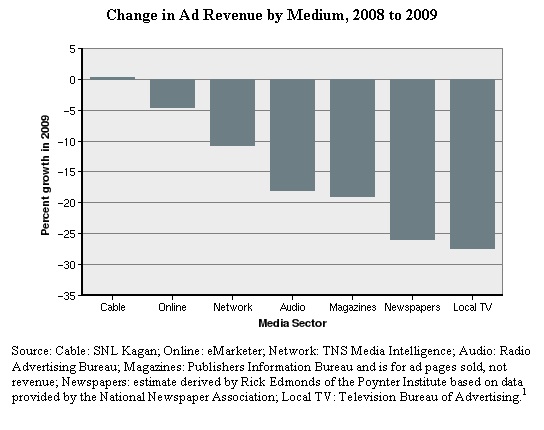The Pew Research Center’s annual State of the News Media 2010 report is out. And it makes pretty gloomy reading, at least for print journalists.
Inside news companies, the most immediate concern is how much revenue lost in the recession the industry will regain as the economy improves.
Whatever the answers, the future of news ultimately rests on more long-term concerns: What are the prospects for alternative journalism organizations that are forming around the country? Will traditional media adapt and innovate amid continuing pressures to thin their ranks?
And with growing evidence that conventional advertising online will never sustain the industry, what progress is being made to find new revenue for financing the gathering and reporting of news?
The numbers for 2009 reveal just how urgent these questions are becoming. Newspapers, including online, saw ad revenue fall 26% during the year, which brings the total loss over the last three years to 43%.
Local television ad revenue fell 22% in 2009; triple the decline the year before. Radio also was off 22%. Magazine ad revenue dropped 17%, network TV 8% (and news alone probably more). Online ad revenue overall fell about 5%, and revenue to news sites most likely also fared much worse.
Only cable news among the commercial news sectors did not suffer declining revenue last year.
The estimates for what happens after the economy rebounds vary and even then are only guesses. The market research and investment banking firm Veronis Suhler Stevenson projects that by 2013, after the economic recovery, three elements of old media — newspapers, radio and magazines — will take in 41% less in ad revenues than they did in 2006.
For newspapers, which still provide the largest share of reportorial journalism in the United States, the metaphor that comes to mind is sand in an hourglass. The shrinking money left in print, which still provides 90% of the industry’s funds, is the amount of time left to invent new revenue models online. The industry must find a new model before that money runs out.

